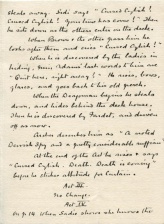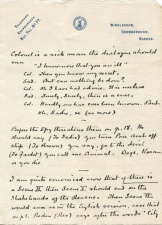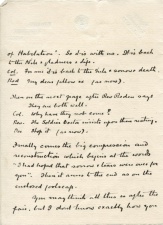Letter about changes to the play The Fires of Fate (1909)
This letter was written by Arthur Conan Doyle probably in 1909, from Windlesham, Crowborough, Sussex, to an unknown correspondent.
He sent changes to his play The Fires of Fate, which was premiered on 15 june 1909 at the Lyric Theatre in London.
Letter
Act I.
Only change to make the Religious position more clear is Rev. Roden's speech on page 8 Tapped Copy, which would now read "How could you, James, until your own soul is divorced from matter ? Don't you see that God is shaping the world and all that is in it, to His own high ends?" To which the Dr. continues "Look here, Samuel etc.
On same page lower down read 'Good' for 'beneficent'.
Act II.
The Changes here chiefly affect the Spy Sidi, whom we will follow. His position must be made more menacing and clearer.
When the Curtain rises there is no one on deck. Sidi its at the back. He rises, goes to the gang plank, looks around and whistles. The second Arab chief comes out from among the rocks. Sidi bows low. They whisper together and shake their fists at the boat. The chief steals away. Sidi says "Cursed English! Cursed English! Your time has come!" Then he sits down as the others enter on the deck.
When Brown and the other pass him he looks after them and cries "Cursed English!"
When he is discovered by the ladies in hiding, Miss Adams' last words to him are "Quit here, right away!" He rises, bows, glares, and goes back to his old perch.
When the Drayman begins he steals down, and hides behind the deck house. Then he is discovered by Fardet, and driven off as now.
Archer describes him as "A noted Dervish Spy and a pretty considerable ruffian".
At the end of the of the Act he rises and says "Cursed English. Death. Death is coming" before he strikes altitude for Curtain.
Act III.
No change.
Act IV.
On p. 14 when Sadie show she knows the Colonel is a side man the dialogue should run
- "I know now that you are ill"
- Col. Then you know my secret.
- Sad. But can nothing be done?
- Col. Oh I have had advice. It is useless
- Sad. Surely, surely, there is a case.
- Col. Hardly one has ever been known. But Oh Sadie, etc (as now)
Before the spy threatens them on p. 18. He should say (to Sadie) you turn Poor Arat off ship (to Brown) you say, go to the devil (to Fardet) you call me Animal. Dogs, Koran or you die.
I am quite convinced now that if there is a Scene II then Scene I should end on the shake hands of the Rescue. Then Scene II would run as in the English version, save that on p. 1 Roden (Rev) says after the words 'City of Habitation'. So it is with us. It is back to the Nile and gladness and Life.
- Col. For me it is back to the Nile and sorrow death.
- Rod. My dear follow etc (as now).
Then on the next page after Rev. Roden says
- They are both well.
- Col. Why have they not come?
- Rev. The soldier Doctor insists upon than resting.
- Doc Stop it (as now)
Finally comes the big compression and reconstruction which begins at the words "I had hoped that sorrow and tears were over for you". Then it runs to the end as on the enclosed foolscap.
You may think all this is after the fair, but I don't know exactly how you may be situated and I feel this is all to the good. I regret any end which does not preserve those humourous touches which send the people home in a happier mood.
Yours very truly
Arthur Conan Doyle




